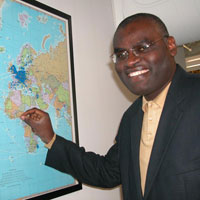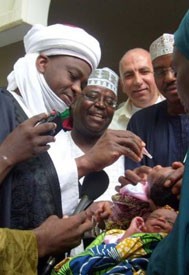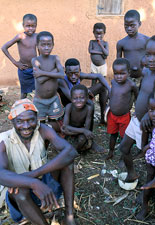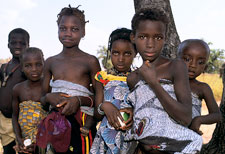Bioethics takes root in Nigeria
November / December 2011 | Volume 10, Issue 6

Photo courtesy of
Dr. Clement Adebamowo
Fogarty bioethics grantee Dr. Clement
Adebamowo drafted Nigeria’s first national
ethics code and has provided training for
more than 1,000 West African
researchers.
By Steve Goldstein
When he lectures on research ethics, Nigerian scientist and oncologist Dr. Clement Adebamowo begins by quoting German-born philosopher Hans Jonas, who said the loss of moral values due to a ruthless pursuit of scientific progress "would make its most dazzling triumphs not worth having."
Examining the bioethics landscape in Nigeria today, it's difficult to imagine how recently it was a barren plain. Adebamowo recalled a "perfect storm" of events that spurred him to develop the Fogarty-supported bioethics training program located at the University of Ibadan.
In 1996, a controversial drug trial conducted during a meningitis outbreak caused fatalities, triggering a backlash against researchers and creating suspicion of vaccines. This led to a resurgence of polio, which spread to neighboring countries. Meanwhile, Western organizations were gearing up efforts to combat HIV/AIDS and malaria in African countries, including Nigeria. Global outsourcing of clinical trials was growing in popularity, taking advantage of low-cost settings with little or no regulation. Finally, the "Out of Africa" theory of evolution was generating additional interest among researchers keen to conduct population studies in the continent that might determine the genetic basis of diseases.
At the same time, Nigeria was going through political change, adopting a democratic government in 1999 that began engaging with civil society to improve conditions, including health, Adebamowo remembered. He convinced officials that research and bioethics should play an important role. "There was some sensitivity to research ethics but it was not formal, it was not large scale and it was not pervasive."
Adebamowo began his bioethics training program with a Fogarty planning grant in 2004. He and his team developed web resources, conducted sensitivity and public awareness campaigns, and offered training to institutions to strengthen their research ethics committees. Once he received a full grant - funded by Fogarty and the National Human Genome Research Institute - he launched a master's degree program designed to serve as a bioethics resource for all of West Africa. The first class of master's students were drawn from nursing, biomedical research and public health. Coursework included classes on informed consent, research designs, philosophy of bioethics, religion and ethics, and qualitative and quantitative research methods.

Photo courtesy of USAID
A controversial drug trial caused
many Nigerians to fear vaccines,
leading to a resurgence in polio.
Religious leaders joined efforts to
restore confidence in vaccines and
evidence-based medicine.
Eight of his faculty obtained master's degrees in bioethics through established Fogarty training programs in the U.S. and Canada. They in turn have provided instruction at Ibadan, mentoring 20 students through the master's program and more than 1,000 West African researchers through the short course. The "multiplier effect" is huge, Adebamowo observed.
"For us in Nigeria, the Fogarty funding for bioethics changed the entire landscape. What we have now would have been impossible without the Fogarty funding," he said. Previously, individuals who received international training in bioethics would return to home "like being cast loose on an ocean, with no focus, no organizing principle and no idea of how they could continue to use that skill."
Bioethics was also significant as the first-ever multidisciplinary degree program developed at Ibadan, involving faculty collaborators from 13 different departments, from philosophy and law, to sociology, psychology and nursing.
In concert with his training efforts, Adebamowo also helped the health ministry transform Nigeria's national ethics system and drafted the country's first formal code for research ethics. His trainees held or assumed positions in state and federal institutions, creating a framework and resource as the code was implemented. His NIH funding provided credibility, he said, which was helpful as he re-established and chaired the National Health Research Ethics Committee, created a web-based research protocol tracking system, and initiated or strengthened 25 Institutional Review Boards across the country.

Photo by Curt
Carnemark/World Bank
Illiteracy, cultural traditions and
religious beliefs make clinical
research especially challenging
for scientists working in Nigeria.
The code lays out principles and guidelines for ethical behavior, such as research studies must have social and scientific value to the participants, be scientifically valid, minimize risks and maximize health benefits. In addition, proposed trials must be independently reviewed and must demonstrate the informed consent of participants. The code serves as a training tool for researchers who apply it in their institutions and use their experience to further develop and refine it.
Bioethics is the key to unlock research in a developing country like Nigeria, said Adebamowo. "Research is an imperative, a public health good," he said. "Ethics capacity increases awareness of the need to respect our collective humanity and think even more about the most scientifically rigorous method of testing a hypothesis without research misconduct."
Nigeria presents specific challenges to consent due to illiteracy and religious differences. A large segment of the population may not accept scientific explanations of diseases. Culture, education and religion play a major role in national identity, acceptance of what is wrong or right, and the level of privacy that is appropriate.
Currently, Adebamowo is exploring ethics research issues as applied by Nigerians of Muslim and other religious backgrounds, to see "how they grapple with research ethics and apply philosophies from those moral traditions to these issues," he explained.
The Nigerian educational system, like many in developing countries, is based on rote learning. "To make students walk away from that learning is quite a challenge," Adebamowo said. "My goal is for them to take the tools they've been given and use them to engage with the ethical issues they come across. What we are trying to do is not just import Western concepts but to teach students in Nigeria the philosophical methods, the quantitative and qualitative research methods that they can use to grapple with the ethical issues that occur within their research environment."

Photo by Curt Carnemark/World Bank
Children are the most vulnerable research
subjects and require particular care for
informed consent.
Similarly, Adebamowo said he's built a flexible national ethics committee that will evolve over time. "It's not a dormant committee but is functioning and responding to its environment."
The cultural shift has been enormous and will have lasting impact, he said. "The most significant thing we've achieved is elevating the status of research ethics and helping researchers and Nigerians in general appreciate the value of ethical conduct of research," said Adebamowo. "We have more people who know that there is a way of doing research that is both scientifically appropriate and ethically sound. Those people will pass this down to their trainees, so over time a better research culture will develop."
Adebamowo ends his ethics lectures with a quote from Pope Pius XII, who said that "science is not the highest value to which all other orders of values... should be subordinated." Adebamowo wants trainees to understand that it is not so much what you do but how you do it. "We want to find the cure for HIV/AIDS," he tells them, "but if we find the cure in an unethical manner, it will not be worth it."
More Information
To view Adobe PDF files,
download current, free accessible plug-ins from Adobe's website.
Related Fogarty Programs
Related World Regions / Countries
Related Global Health Research Topics